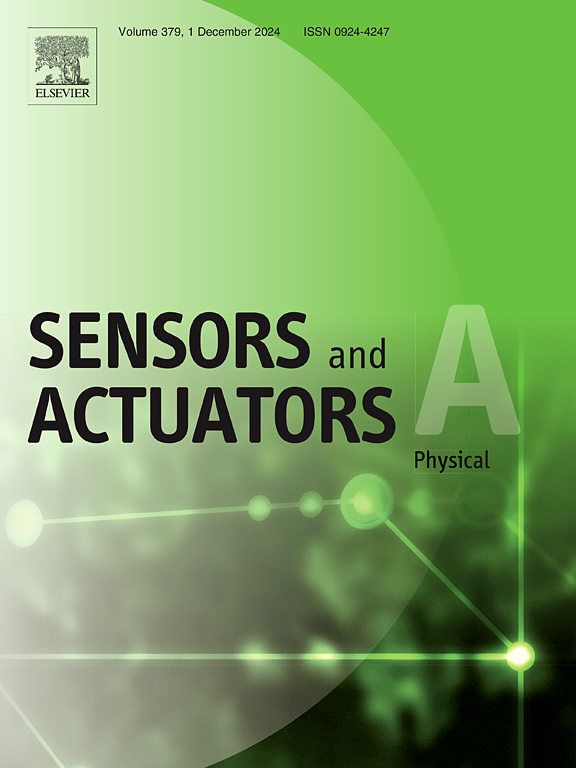A wearable iontronic sensor for nasal cannula-facial interface pressure distribution evaluation
IF 4.1
3区 工程技术
Q2 ENGINEERING, ELECTRICAL & ELECTRONIC
引用次数: 0
Abstract
Enhancing the comfort of high-flow nasal cannulas holds practical significance in clinical settings, as it can alleviate pain during treatment, improve patient compliance, and reduce the occurrence of facial pressure sores during extended wear. The pressure distribution at the nasal cannula-facial interface is a key factor affecting comfort. In this paper, we present a flexible iontronic sensor with ultra-high sensitivity (up to 0.6 nF/mmHg), low activation pressure (as low as 1 mmHg), and a fast response time (up to 30 ms) for measuring pressure at the nasal cannula-facial interface. The introduction of a poly (methyl methacrylate) (PMMA) bonding layer enables the ionic layer to form a robust sensing interface with the electrode. A unified pressure distribution measurement scheme was established, and 10 subjects were recruited to wear four brands of commercially available nasal cannulas to evaluate the dynamic pressure distribution in different states. The proposed device provides a feasible solution for assessing nasal cannula comfort and provides a quantitative evaluation framework for optimizing nasal cannula designs, with direct implications for patient care.
用于鼻插管-面部界面压力分布评估的可穿戴离子电子传感器
提高大流量鼻插管的舒适度在临床中具有重要的实际意义,因为这可以减轻治疗过程中的疼痛,提高患者的依从性,并减少长时间佩戴时面部压疮的发生。鼻插管-面部界面的压力分布是影响舒适度的关键因素。本文介绍了一种灵活的离子电子传感器,它具有超高灵敏度(高达 0.6 nF/mmHg)、低激活压力(低至 1 mmHg)和快速响应时间(高达 30 ms),可用于测量鼻插管-面部接口处的压力。聚甲基丙烯酸甲酯(PMMA)粘合层的引入使离子层与电极形成了牢固的传感界面。建立了统一的压力分布测量方案,并招募了 10 名受试者佩戴四种品牌的市售鼻插管,以评估不同状态下的动态压力分布。所提出的装置为评估鼻插管舒适度提供了可行的解决方案,并为优化鼻插管设计提供了定量评估框架,对患者护理具有直接意义。
本文章由计算机程序翻译,如有差异,请以英文原文为准。
求助全文
约1分钟内获得全文
求助全文
来源期刊

Sensors and Actuators A-physical
工程技术-工程:电子与电气
CiteScore
8.10
自引率
6.50%
发文量
630
审稿时长
49 days
期刊介绍:
Sensors and Actuators A: Physical brings together multidisciplinary interests in one journal entirely devoted to disseminating information on all aspects of research and development of solid-state devices for transducing physical signals. Sensors and Actuators A: Physical regularly publishes original papers, letters to the Editors and from time to time invited review articles within the following device areas:
• Fundamentals and Physics, such as: classification of effects, physical effects, measurement theory, modelling of sensors, measurement standards, measurement errors, units and constants, time and frequency measurement. Modeling papers should bring new modeling techniques to the field and be supported by experimental results.
• Materials and their Processing, such as: piezoelectric materials, polymers, metal oxides, III-V and II-VI semiconductors, thick and thin films, optical glass fibres, amorphous, polycrystalline and monocrystalline silicon.
• Optoelectronic sensors, such as: photovoltaic diodes, photoconductors, photodiodes, phototransistors, positron-sensitive photodetectors, optoisolators, photodiode arrays, charge-coupled devices, light-emitting diodes, injection lasers and liquid-crystal displays.
• Mechanical sensors, such as: metallic, thin-film and semiconductor strain gauges, diffused silicon pressure sensors, silicon accelerometers, solid-state displacement transducers, piezo junction devices, piezoelectric field-effect transducers (PiFETs), tunnel-diode strain sensors, surface acoustic wave devices, silicon micromechanical switches, solid-state flow meters and electronic flow controllers.
Etc...
 求助内容:
求助内容: 应助结果提醒方式:
应助结果提醒方式:


